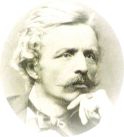About The Faculty
Obuda University
Budapest Tech (predecessor institute of Obuda University) was established in 2000 as a result of the amalgamation of three technical colleges. Following the nearly 130-year old traditions of its forbears, these days Obuda University is responsible for training altogether 13,000 students in Budapest and Székesfehérvár. In Budapest the campuses can be found in Óbuda (3rd district) and Józsefváros (8th district). The head office and training premises of Keleti Károly Faculty of Business and Management are located in Józsefváros.
More information about the Obuda University: uni-obuda.hu
Keleti Károly Faculty of Business and Management

Our faculty is named after Károly Keleti (1833–1892), a broad-minded European thinker-philosopher, economist and statistician. Besides being a recognised scientist ha was also an excellent manager and good administrator and is regarded as the founder of the Hungarian Central Statistical Office. The first, scientifically planned census, held in 1880, is due to Keleti’s efforts. As an acknowledgement of his work in statistics and on the national economy, in 1890 he was elected to the Board of the Hungarian Academy of Sciences.
When Budapest Tech was founded, the formerly separately taught economics and social science subjects were integrated into one independently managed organisational unit. The Faculty has the following departments:
- Department of Economics, Finance and Accounting (Közgazdaságtudományi, Pénzügyi és Számviteli Intézet)
- Department of Marketing, Management and Methodology (Marketing, Menedzsment és Módszertani Intézet)
- Department of Business Sciences and Digital Skills (Üzleti Tudományok és Digitális Ismeretek Intézet)
Our faculty offers training courses in compliance with the Bologna System. In the new educational structure the first level is basic training (BSc, BA). Such first degree courses focus on practical professional training demanded by potential employers, and at the same time provide a good grounding for theoretical knowledge enabling students to further their studies on a Master’s degree course (MSc, MA) if desired. In the linear training system such a Master’s course normally takes 4 semesters. After graduating from a Master’s, a student can start working or opt to continue with his or her studies by applying to enter a PhD programme, the peak of tertiary education.
Students must obtain 210 credits during the 7 semesters of BSc and BA courses, while 120 credits are necessary on the 4-semester Master’s courses. The courses are tailored to the demands of the labour market. Life-long learning is a basic principle encouraging the up-date of knowledge, the acquisition of new skills and abilities as well as professional competences. It is also necessary to gather practical experience during on-site practice.